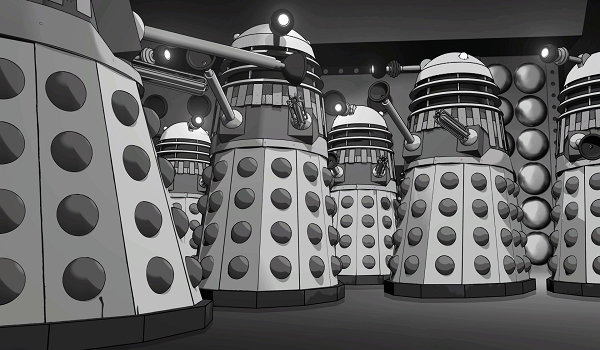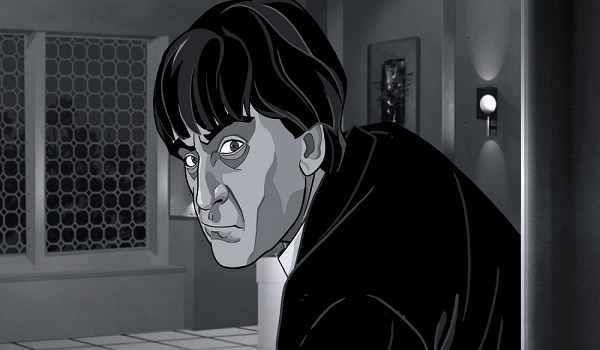This month marks the 50th anniversary of Patrick Troughton‘s debut on Doctor Who and to help celebrate this landmark occasion us fans are blessed with the return of his very first serial, “The Power of the Daleks”. This story was only ever aired once on BBC 1 before later being discarded from the BBC Archives, thought to be lost forever. But now the six-part serial has been regenerated (you might say) in animated format and synced with the original audio. Without further ado, strap yourselves in as we travel back to 1966 – the year that changed everything.
“The Power of the Daleks” is a terrific journey to follow, and certainly an important one due to the fact that this featured the first regeneration following William Hartnell‘s departure in the previous serial, “The Tenth Planet”. I bet it must have been a scary ordeal for the viewers back in 1966 as they witnessed their beloved hero change before their very eyes and had to readapt to the entire show via this mysterious new concept (a concept that would later become an important role for the show and its longevity). Polly and Ben Jackson pretty much convey the viewers confusion and are placed with the burden of being the first companions to witness regeneration, despite only travelling with The First Doctor for three adventures prior to this serial.
It is a little convenient that Polly almost immediately adapts to The Doctor’s change in appearance and personality but I suppose this worked for her character who is a good judge of character, as well as giving the viewers a motivation for trusting the new man onscreen. Ben, on the other-hand, is very sceptical towards The Second Doctor and tries his best to prove he isn’t The Doctor.
It’s interesting when he tries to test his confused feelings by showing The First Doctor’s ring doesn’t fit The Second Doctor, but he then aptly states, “I’d like to see a butterfly fit into a chrysalis case after it spreads its wings,” thus discrediting Ben’s accusations and granting the viewer reason to believe that the man before them is still the same man, merely transformed after a state of metamorphosis.
This continues throughout the first two episodes as Ben conveys the confusion of the viewer. Troughton was clearly different to Hartnell in every way shape and form and it’s rather concerning to follow, making it hard to adapt and trust this new man. But none-the-less it is an intriguing transition to follow as The Second Doctor adjusts himself and finds his feet. After all, this is the first time The Doctor has ever undergone regeneration and therefore it’s understandable that it will take time to adapt to his new body.
I do like that The Second Doctor gets underway quite quickly in order to display his characteristics early on but it’s still nice to see the touch of early signs of post-regenerative problems. Most interesting of all is his inability to concentrate at first and needing time to sort out his senses, along with the idea that even his reflection in a mirror needed time to catch-up with itself. But even after you believe The Second Doctor has found his footing he is still trying to adjust. It’s clear early on that his memory is still shaky, resulting in him speaking about his previous incarnation in the third perspective, which I found to be a rather fascinating concept, adding to further confusion of whether or not he is still the same person.
On top of this it is unclear how much control he has over his new body, even at the very end when he cannot answer whether or not he knew what he was doing. There were many moments which left you wondering why it wasn’t handled in a certain way, or why The Second Doctor didn’t raise his voice of concern a little more. Was he still recovering from his regeneration or were these early implications of his mind adjusting to his new persona?
It’s also fascinating how The Second Doctor’s disguise as the Examiner almost reflects his ongoing change, having taken on the role of the previous person (who promptly died) and trying to convince others that he is the same person. I will admit that it can be hard to adjust to Troughton after Hartnell but I suppose my advantage is I already liked him from watching his later serials.
It’s clear from the start that he is a different persona but that is what you have to give him, and the production team, credit for because they create a brand-new character whilst still retaining the core elements of Hartnell. This serial demonstrates how this simplistic idea can become something rather clever and helped to not only develop the show, but also The Doctor’s character as well, allowing future stories to explore whole new areas of ideas.
But perhaps this serial wouldn’t have been as successful had it not been for the appearance of the Daleks. I think their popularity helped to keep viewers invested long enough to accept Troughton as The Doctor. Plus right off the bat you’re getting a new interpretation of The Doctor and the Dalek’s conflict through the eyes of a new lead-actor.
Because of The Second Doctor’s state of mind he is unable to fully remember the true danger of the Daleks until it is too late and due to his new bumbling appearance he isn’t taken seriously, unlike his previous-self that held high authority through his booming voice and aged appearance. So this clearly placed Troughton at a disadvantage and thus enhanced the narrative, making this without a doubt the most chilling Dalek story to date.
I loved how the Daleks are sly, devious and manipulative throughout this six-part serial. They are fully aware that their future depends on Lesterton and the power he has given them. But what aids them is the ongoing disputes between the human colony around them, granting them an easy ticket into using these events to their advantage. By manipulating the events they give themselves the opportunity to rebuild their army and prepare for their take-over. But by doing this slowly and having the voice of reason shrouded over by greed for further power only helps to enforce the inevitable event of destruction.
Lesterton’s character is a great addition to this on-going arc as he is the one who desperately wants to use the Daleks at the very beginning to further exploit his scientific discovery. His naivety in the first half of the serial truly shows humanity at its most stupidest as he believes he can control the Daleks and use them for his own needs but this ultimately lends the Daleks what they need to bring about their own designs.
It’s rather clever how Lesterton begins to doubt his decision and ultimately falls apart in a state of hysteria once he realises that The Second Doctor was correct all along. Of course he is dismissed as a mad-man as other characters manipulate him, similar to the Daleks, to achieve their own goals through the Daleks. His character meets a perfect end when he is killed by his apparent servants after he attempts to become their servant (cleverly reversing their roles) after becoming deranged.
I like how the title of the serial represents the narrative perfectly. It isn’t just about the Daleks gaining their power back but also how other’s are trying to exploit that power for their own evil agendas, whilst using this idea to fall back on the core aspect. All the different aspects come together perfectly to tell a tale of what happens when someone tries to control something that cannot be controlled, as well as understanding the power of manipulation. Everyone is trying to manipulate each other to get what they want and whilst the human enemies, led by Bragen, believe that they are in control when they are oblivious to the fact that the true threat all along was the Daleks, the very servant they believed to be controlling.
Though Bragen comes across as a one-dimensional villain in both his performance and motives, his sub-plot (as stated above) adds so much to the narrative in allowing the Daleks to become these intimidating foes in the background waiting to emerge. “The Daleks” portrayed them as Nazis, “The Dalek Invasion of Earth” portrayed them as cruel conquerors, “The Daleks’ Master Plan” portrayed them as mad geniuses, whilst “The Power of the Daleks” tried something completely different by making them patient as they calculated their stratagem in a more cruel, and personal game that left you feeling rather tense as you weren’t fully aware when they would turn on the colonists.
It is brilliant to see everything come together in Episode Six after several characters (mostly The Second Doctor) tried to warn everyone about the Daleks. Bragen believes he is in control, soon to be the king of his own little world of madness, whilst other colonists attempt to retain their own form of power. All the while the Daleks make their plans in the background and manipulate every possible scenario in order to make their move.
This serial without a doubt places them at their most dangerous by having them being quiet thinking machines rather than being the usual squawking, and overused killing machine. It makes it all the more exciting when they do revert back into their natural state of operation for the conclusion, making their onslaught of the colony have more impact and meaning.
Onto the animation. I do feel at times it can feel a little weak. But for the most part it does well at capturing the imagery of the lost serial, and when you consider the team involved only had old tele-snaps, and small pieces of footage, to work with it goes to show how talented and dedicated they were to bring this story back to life. However it isn’t exactly delivered in the highest quality animation, which at times can make scenes feel jerky, particularly when it comes to character movements. At other times the animation is fluid, especially when it comes to the Daleks. A lot of praise has to go to the concentration of Troughton’s performance as you feel every emotion and action he delivers come to life without an ounce of doubt.
I thank Charles Norton and his team for their strong attempts at bringing this story back to life, especially given the time-frame and budget they had to work with. It makes me feel really happy as a fan to be able to finally add this serial to my DVD collection and have true hope that if this release is successful we may finally get the remaining “Lost Stories” brought back to us in this format.
“The Power of the Daleks” was the best possible start for Troughton, and by that, helped to ease his transition. Not only is it a fantastic story, it’s also a fantastic introduction to all the new concepts and ideas, as well as being a fantastic Dalek narrative. The serial may seem slow at times but honestly it is necessary to build-up the tension and suspense for when the Daleks eventually take over. Not to mention the great moments of reveal when we see the cunning Daleks showcase their growing power through the iconic Dalek assembly-line scene, and the dramatic “Daleks conquer and destroy” scene (both making for shocking cliff-hangers).
This serial will be remembered as a landmark occasion for both the show and television in general. The production team, and Troughton, made a difficult transition work and showcased that making a leap of fate can sometimes pay-off.
To all Whovians out there, please tell us what you think of this iconic episode? Please share your thoughts, and even your favourite moments, either in the comment section below or on our Twitter page!



